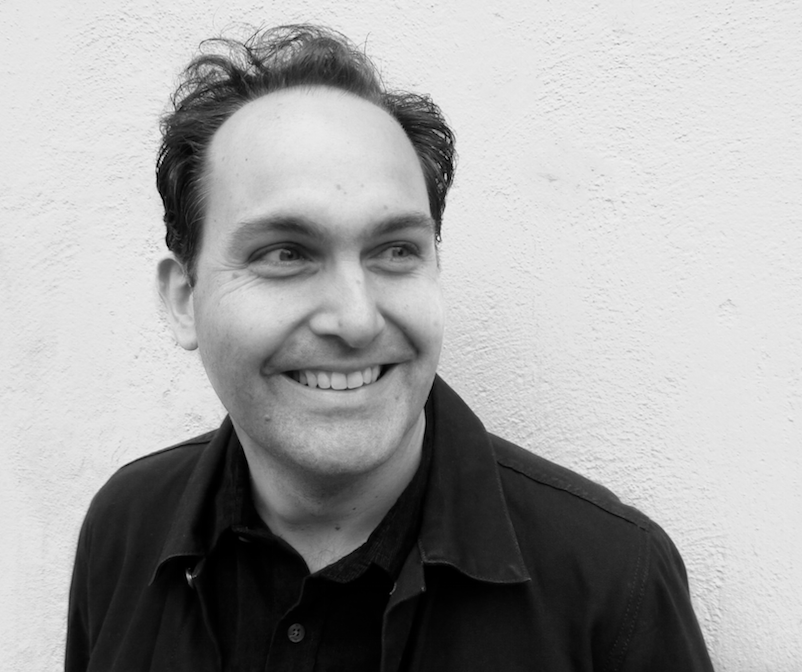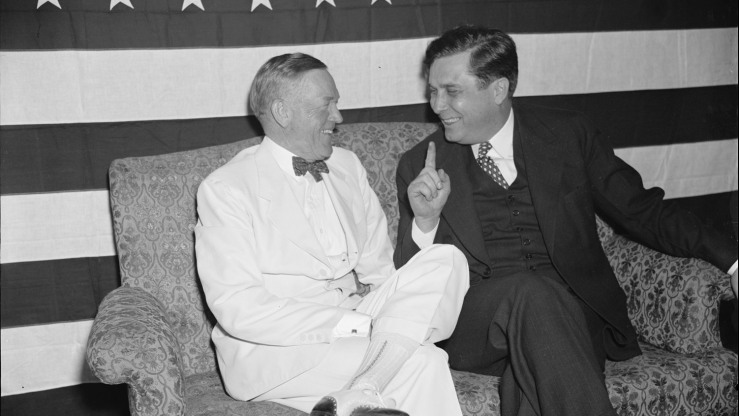In his new book "The Idealist," associate professor Samuel Zipp argues that Willkie's World War II-era "one world" idea could help guide how the U.S. evaluates its role on the world stage.
PROVIDENCE, R.I. [Brown University] - Many Americans may remember Wendell Willkie as the Republican presidential candidate who lost to Franklin D. Roosevelt in the 1940 election, handing FDR an unprecedented third term. Others may not recognize his name at all.
Only a select few know that Willkie was much more than a would-be president. Samuel Zipp, an associate professor of American studies and urban studies at Brown University, is one of them.

Zipp's new book, "The Idealist: Wendell Willkie's Wartime Quest to Build One World," chronicles a game-changing international trip Willkie took in 1942 as an informal envoy to Roosevelt and describes his resulting "one world" idea: That democratic, anti-imperial international cooperation, rather than nationalism and isolationism, would help position the U.S. as a true leader of the free world and put power in the hands of regular people across the globe.
In his book, released by Harvard University Press this month, Zipp argues that Willkie's 20th century ideas still matter today. Seventy-five years ago, Willkie helped convince the country's leaders to join the fight against fascism, even as many wealthy and prominent figures cried "America First." Today, as President Donald Trump reclaims the phrase "America First" in his rallies and re-election campaign, Zipp said it seems more urgent than ever that Americans consult globalists such as Willkie in order to understand the important role their country plays on the world stage. "One world" thinking might even help us confront the COVID-19 crisis, he argued in a recent Washington Post essay.
Following the book's release, Zipp discussed Willkie's wartime role and how the politician's ideas could help guide international relations in times of war, peace and pandemics.
Q: Give us a refresher course: Who was Wendell Willkie, and what was his legacy?
When Willkie is remembered at all, it is as the failed 1940 Republican presidential candidate. A lifelong Democrat, he upended the election when he switched parties and ran as a Republican. He was a critic of Franklin D. Roosevelt's New Deal, but also an internationalist who felt, like FDR, that the U.S. would eventually have to get into World War II. His candidacy neutralized the anti-interventionists in the Republican Party - many of whom gathered under the banner of America First, led by the flier Charles Lindbergh - who wanted the U.S. to stay out of the fight against fascism.
But I think Willkie's true significance goes further than U.S. politics and elections. He should be remembered today for the story my book tells: his trip around the world in 1942, the impact of his bestselling book "One World," and his quixotic campaign for a much bigger idea. The trip, taken with Roosevelt's cooperation, was a 49-day aerial circumnavigation of the planet during the darkest weeks of the war. Forced to avoid occupied Europe, he visited the El Alamein front outside Cairo, toured the new nations and restive European semi-colonies of the Middle East in Turkey, Lebanon, Palestine, Iraq and Iran, and visited with Joseph Stalin in the Soviet Union and Chiang Kai-shek in China. The trip and his book were hugely popular wartime events - and with them he challenged Americans to imagine a different global future. He presented the country, and the world, with a dilemma we still face today.
Q: Willkie was a "one world" advocate. Can you explain what that means?
"One world" became his catchphrase - and a kind of talisman of wartime life for those who wanted to see the U.S. accept a capacious, democratic role in a globalizing world. The phrase had been used before, by other internationalists, but for Willkie it had its roots in his trip. The trip showed Willkie that airplanes, modern communications and a global war had shrunk the planet. The world, he argued, had "become small and completely interdependent." This was the idea that "one world" was meant to convey: Americans - often content to imagine themselves separate from the rest of the world - were intermeshed with the fate of other peoples everywhere.
The most important thing about the new interdependence was that it forced Americans to see things they tended to ignore. He discovered that many people around the world saw the war not as a showdown between freedom and fascism, but as a chance to win freedom from Western racism and imperial domination. With his speeches and writings - he reached more than 36 million people with his post-tour radio reports, and "One World" was called by some "the fastest selling book in American history" - Willkie carried this message back to Americans. His political charisma, and the breezy tales he told of meeting the ordinary and exalted, showed Americans what it would feel like to reorder their view of the world. He placed himself at the center of a vast upsurge of interest in internationalism in U.S. political culture during the war. He became the best-known advocate for a popular, progressive vision that would enlist the American people in a campaign for a new world organization (to replace the failed League of Nations) that, he hoped, would give equal power to all peoples and help usher colonialism off the world stage.
...[T]he future of humanity rests on finding some way to work together, interdependently, on answers.
Q: In what direction might Willkie have taken our country if he had become president?
It's hard to say. If he'd won in 1940 he might have pushed for things Roosevelt would or could not - more aggressive civil rights measures like an anti-lynching bill or legislation to end the poll tax in the South - and he certainly would have put forth a more expansive and democratic plan for what would become the United Nations.
Willkie died young - at 52 in the fall of 1944 - after his second bid for the Republican nomination failed, but before he would have seen his internationalist vision only partially realized. The new United Nations would eventually help end European empire, but it was also structured, by Roosevelt's design, to favor the large powers in the Security Council, which meant that it acquiesced to the rise of a new kind of global American empire and a diminished role in world affairs during the Cold War. Willkie failed, but his story is not only one of a "road not taken," but of pressing challenges and dilemmas still unfaced.
Q: Why are Willkie's "one world" ideas worth thinking about today?
We still live with Willkie's "one world." His ideas about interdependence have, in one way, become second nature to us. The idea of one world echoed through the 20th century and beyond in anti-nuclear activism, in visions of world governance, in anti-imperial struggles, in environmentalism and in our current age of financial and tech-led globalization.
On the other hand, Willkie's ideas had less success in official foreign policy circles. Often disregarded as naïve, his ideas faded during the Cold War, when the strategic vision he championed - cooperation with the Soviet Union and immediate planning for decolonization - was deemed callow and insufficiently protective of U.S. national interests.
The long-term result is that Americans have gone global, but only on our own terms. We have too often taken globalization for granted - accepting the benefits of the swift movement of capital, goods and communications, protected by U.S. military supremacy - while being less sure of what to do about globalization's perils: inequality, a warming planet, and of course, the threat of pandemics. American world domination is coming to an end. We have to figure out how to live in the world again. Willkie can help us face that challenge.
Q: How might we apply Willkie's ideas to domestic policy and international relations as we fight the spread of COVID-19?
As I've recently argued, the real lessons might come in the medium term, after the immediate crisis subsides, and should help us think of practical solutions for the long term. We would do well to remember the lesson Willkie brought back to us during the last great crisis. It's a simple lesson, and we all know it, but we don't yet know what to do about it: We are all, everyone on the globe, interconnected.
Thinking in terms of "one world" is easy to do in some ways. Too easy, maybe. We've made it so with the internet, global supply chains and interconnected stock markets. But it's much harder in other ways: Can we really feel for the problems of people all over the world? Global warming and COVID-19 suggest we will have to in some way. Thinking anew with "one world" does not mean trying to found some utopian world government, but maybe it asks us to think again about those institutions at the national and international level - the creaky apparatus of social welfare and global governance - that allow humanity to react to these threats.
Willkie does not have the answers to these problems, but he challenged Americans to face the dilemmas of interdependence at another time of global crisis. His quandaries are still with us - all of us can feel that these days - and the future of humanity rests on finding some way to work together, interdependently, on answers.







